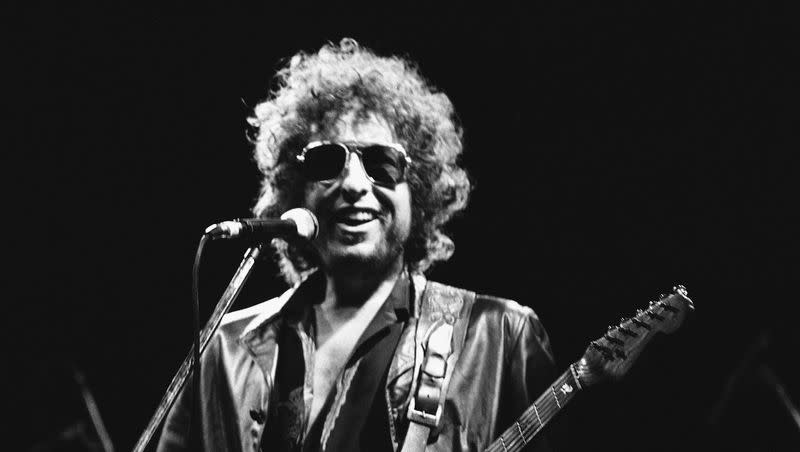Why a new book may be key to understanding the faith of Bob Dylan

- Oops!Something went wrong.Please try again later.
“Well I’m pressing on / To the higher calling of my Lord. / Many try to stop me, shake me up in my mind, / Say, ‘Prove to me that He is Lord, show me a sign.’ / What kind of sign they need when it all come from within, / When what’s lost has been found, what’s to come has already been?”
These lyrics weren’t authored by an artist defined by the Christian music genre. Bob Dylan wrote them. It’s one of his many references to religion in his music.
To say Dylan has had the career of a lifetime may be an understatement. Emerging as a musical talent in the 1960s, he became known for authoring songs used as anthems of the civil rights movement as well as anti-war tunes. His career has stretched on for several decades and along the way, he’s picked up honors like his induction into the Rock & Roll Hall of Fame, a special citation from the Pulitzer Prize Board and a Nobel Prize in literature.
A new book, “Bob Dylan: Mixing up the Medicine,” preserves some of the Dylan documents that shed light on the singer’s embrace of Christianity.
As the story goes, Dylan performed at a San Diego venue in 1978 and picked up a silver cross a fan had thrown on stage, per Fox News. Two days later, he had a experience he later described by saying, “I felt my whole body tremble. The glory of the Lord knocked me down and picked me up.”
He released a series of gospel songs as he embraced Christianity. “Mr. Dylan showed that neither age (he’s now 40) nor his much-publicized conversion to born-again Christianity has altered his essentially iconoclastic temperament,” Stephen Holden wrote for The New York Times in 1981.
While Dylan’s embrace of Christianity and subsequent Christian records seemed sudden to the public eye, the new book sheds some light on how Dylan changed over time.
One of the book’s editors, Mark Davidson, explained to Fox News, “The surprise of Dylan becoming a Christian and then creating this trilogy of gospel records may seem like sort of like a shocking left turn. ... But in the book, we show how those seeds were planted.”
“He’s recording exclusively gospel music, but these were themes he was exploring long before that cross was thrown on the stage in San Diego. If you look at his drafts written in stationery from hotel rooms, in between or after gigs, it predates that,” the book’s other editor, Parker Fishel, told Fox News.
After this experience in San Diego, he recorded three albums that had Christian-inspired music on them: “Slow Train Coming,” “Saved” and “Shot of Love.” From 1979 to 1981, Dylan was absorbed in producing this kind of music.
From songs like “When He Returns” and “Watered-Down Love,” these three albums had Bible references and allusions to Christian theology.
Not all in the music industry responded favorably to Dylan’s music. After he released the song “Gotta Serve Somebody,” John Lennon parodied it in the tune “Serve Yourself.”
While some have contended Dylan’s relationship with Christianity ended in 1981, Scott Marshall said, “Those that say that probably haven’t been reading the story closely.”
“His spiritual journey’s been a hybrid of Judaism and his Jesus experience,” Marshall, author of “Bob Dylan: A Spiritual Life,” told Billboard magazine, referencing the singer’s Jewish roots.
“Dylan appears to be a child of God, not tethered to any religion for religion’s sake, but trying to pursue the Truth, clay feet and all,” he told Billboard.
Some, like Francis Beckwith, have seen the influence of spirituality across his career. “Dylan’s genius is biblical, not simply because his art is often informed by Scripture, but because the idea of returning to the sources as a necessary condition for insight and progress is itself a biblical idea,” Beckwith wrote for National Catholic Register.
As for what Dylan has said about his own faith, he opened up to The Wall Street Journal in 2022.
“I’m a religious person,” he said. “I read the scriptures a lot, meditate and pray, light candles in church. I believe in damnation and salvation, as well as predestination. The Five Books of Moses, Pauline Epistles, Invocation of the Saints, all of it.”

